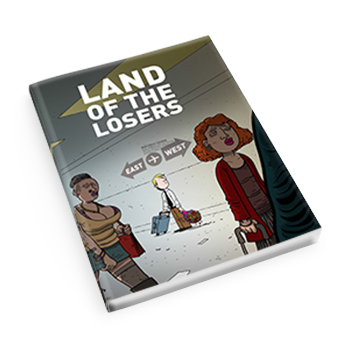Book Review: A World Without Men
The main point of utopian and dystopian fiction has always been to portray a fictional society to juxtapose against our own. Aaron Clarey's latest book, "A World Without Men: An Analysis of an All-Female Economy" does exactly the opposite, giving the reader a cold reality check.
In the aftermath of the 1960s, much sci-fi writing focused less on technological themes and more on social and the psychological ones. Explicitly feminist sci-fi of the day fits well within that current. If you've never had the dubious pleasure of sampling such novels from that time, here's a few summaries:
"The Female Man," (1975 by Joanna Russ), depicts several alternate universes, one of which is Whileaway, centuries after a plague kills off all of the earth's men. The Whileawayers reproduce asexually and live in a carefree utopia. In 1979, Sally Miller Gearhart, founder of one of the first university gender studies programs, released "The Wanderground." This novel described a utopian world without men, where women possess telepathic abilities and use it to communicate with nature. This book was followed by "Daughters of a Coral Dawn" by Katherine Forrest (1984), wherein women establish the eponymous Coral Dawn utopia where they exist happily without the baneful influence of men.
In "The Shore of Women" by Pamela Sargent (1986), a nuclear war devastates the planet. Thereafter, violent and filthy men live in militarized bands outside of women's peaceful, advanced communities. "The Gate to Women's Country" was published in 1988 by Sheri Tepper. Set in a post-apocalyptic future, this novel posits a society where the sexes live separately: men in militaristic compounds and women (you guessed it) in an ecologically-friendly utopia.
Have you noticed a recurring theme yet?
Speculative utopias make great fuel for the imagination, but the genre clearly signals that it is a poor foundation for a real society. In Charlotte Perkins Gilman's "Herland" (1915), there is no war, inequality, or conflict, and everything is simply fabulous. There are no mechanisms for dispute resolution, because harmony is simply presumed. Less well-known about Gilman was her barbaric opinions about dark-skinned people, so the imagined Herland is presumably not an ethnically diverse place...
It all feels a bit reminiscent of a bratty, 7 year old tyke who thinks they'd be better-off without any grown-ups around. There'd be no big bossy adults telling them to clean their room or eat their broccoli. No homework or bedtime. You can jump up and down on the bed and eat ice cream whenever you want.
To that, Clarey's book delivers a sharp: "Wanna bet, kiddo?"
To run the numbers and do the mental exercises would reveal that much of modern life has become so easy and convenient, a lot of women have been tricked into thinking that men are irrelevant to their well-being. Yes, women love to lecture men about all the thankless support that men get from women, never stopping to ask questions about how one-way the deal really is.
That's probably why fictional feminist utopias frequently share the same blind spot: Who's doing all the heavy, vital, unpleasant shit-work?
Somebody has to do it. When the toilet backs up, who will unclog it? Will it be the Liberated Princesses? How gauche! They're too busy eating Haagen-Dazs under a bodhi tree, telepathically bonding with Gaia's creatures.
As a sophomore in high school, I read the 1967 SCUM Manifesto by Valerie Solanas while writing a paper on Andy Warhol. It was a poorly-written fringe screed composed by a barking nutcase, but I have to give her some credit: Solanas actually acknowledges some logistical problems after the men are (humanely!) liquidated in self-emptying gas chambers and self-cleaning voluntary suicide booths. She blithely evades further questions with the claim that "automation" would pick-up the slack in the groovy all-female world of tomorrow. And who would maintain that automation? She didn't say. Presumably other automation would do it. And that, in turn, would be maintained by still other automation. And so on.
One serious attempt to tackle this question was the 2002-2008 comic series "Y: The last man" by Brian K. Vaughan and Pia Guerra. The utopia is basically calamitous. But let's not talk about half of the planet dying. What if half of the planet simply stops supporting the other half?
To that, Aaron asks: "...did anyone take the time to see if women's original claim was at all in any way true? That women were NOT dependent on men? That women truly and factually did not need them?" Well, like it or not, a lot of the single ladies in their 30s and 40s might find out the hard way.
If you'd like to check out Aaron's book, you can find a copy on Amazon here.
------------------------------------------------------------------
"Ignoring isn't the same as ignorance, you have to work at it." -- Margaret Atwood
Return to Niceguy's Land of the Losers Page



